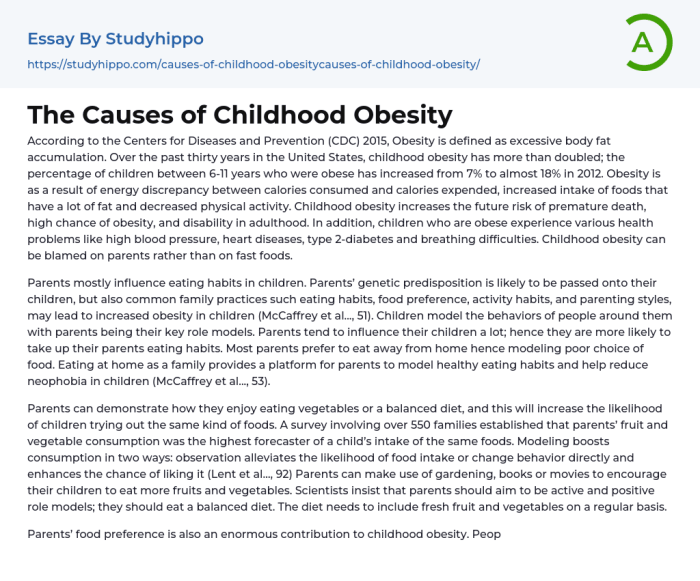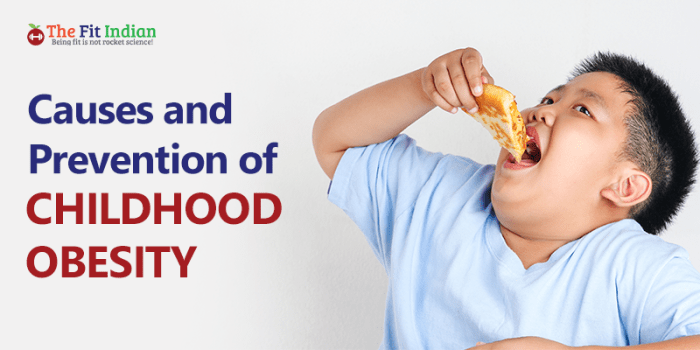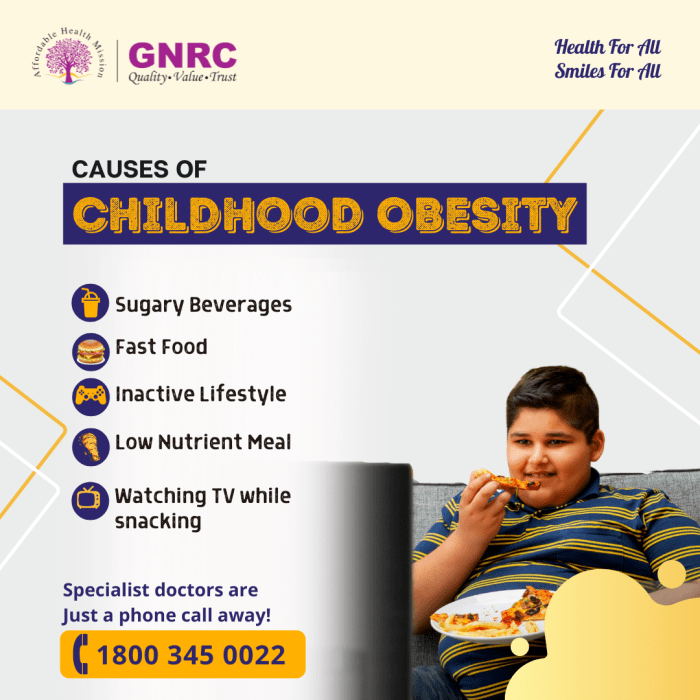Which statement about the causes of childhood obesity is true? This question has sparked considerable debate, with various factors influencing the onset and progression of this complex condition. From genetic predispositions to environmental triggers, understanding the root causes of childhood obesity is paramount in developing effective prevention and intervention strategies.
Research suggests that childhood obesity results from a combination of genetic, environmental, and behavioral factors. Genetics play a role in determining an individual’s susceptibility to weight gain, while environmental factors such as food availability, physical activity levels, and socioeconomic status can significantly impact weight outcomes.
Factors Influencing Childhood Obesity: Which Statement About The Causes Of Childhood Obesity Is True
Childhood obesity is a complex issue influenced by various factors. Understanding these factors is crucial for developing effective prevention and intervention strategies.
Genetics and Family History
Genetic factors play a role in childhood obesity. Studies have shown that children with obese parents are more likely to be obese themselves. This is due to the inheritance of certain genes that regulate appetite, metabolism, and body fat distribution.
Environmental Factors
Environmental factors significantly impact childhood obesity. Food availability and accessibility are major contributors. Children living in areas with easy access to unhealthy foods and sugary drinks are at increased risk of obesity.
Physical activity levels also play a vital role. Children who engage in regular physical activity have lower rates of obesity. However, sedentary behaviors, such as excessive screen time and lack of exercise, contribute to weight gain.
Socioeconomic Status and Cultural Practices
Socioeconomic status and cultural practices influence childhood obesity. Families with lower incomes may have limited access to healthy foods and safe places for physical activity. Cultural norms and food preferences can also impact dietary choices and weight.
Dietary Causes of Childhood Obesity

Unhealthy dietary practices are major contributors to childhood obesity.
Sugary Drinks and Processed Foods
Excessive consumption of sugary drinks, such as soda and fruit juices, is a significant risk factor for obesity. These beverages contain high amounts of added sugars, which contribute to weight gain and metabolic disorders.
Processed foods, often high in unhealthy fats, sodium, and added sugars, are another major dietary cause of childhood obesity. These foods are often energy-dense and low in nutrients, leading to weight gain and health issues.
Unhealthy Eating Habits
Unhealthy eating habits, such as large portion sizes and frequent meals, can contribute to childhood obesity. Overeating and skipping meals disrupt metabolism and promote weight gain.
Nutrient deficiencies, especially in fruits and vegetables, can also lead to obesity. These foods are essential for overall health and satiety, and their lack can contribute to weight gain.
Physical Activity and Childhood Obesity

Regular physical activity is crucial for preventing and managing childhood obesity.
Importance of Physical Activity
Children who engage in regular physical activity have lower body fat levels and a reduced risk of obesity. Exercise helps burn calories, build muscle, and improve metabolism.
Effects of Sedentary Behavior
Sedentary behavior, such as excessive screen time and lack of exercise, is a major contributing factor to childhood obesity. These activities reduce energy expenditure and promote weight gain.
Effective Physical Activity Programs
Effective physical activity programs for children include a variety of activities that are enjoyable and age-appropriate. These programs should aim for at least 60 minutes of moderate-to-vigorous physical activity daily.
Psychological and Social Factors Contributing to Childhood Obesity

Psychological and social factors can also contribute to childhood obesity.
Emotional Eating and Stress
Emotional eating, where children turn to food for comfort or to cope with stress, can lead to weight gain. Stress can also trigger hormonal changes that promote weight gain.
Parental Feeding Practices and Family Dynamics
Parental feeding practices and family dynamics can influence childhood obesity. Parents who use food as a reward or punishment, or who overfeed their children, can contribute to weight gain.
Peer Pressure and Social Norms
Peer pressure and social norms can also impact childhood obesity. Children who have friends who are overweight or who live in environments where unhealthy foods are the norm are more likely to be obese themselves.
Long-Term Consequences of Childhood Obesity

Childhood obesity can have severe long-term health consequences.
Health Risks
Obese children are at increased risk for chronic diseases such as type 2 diabetes, heart disease, and stroke. They may also experience developmental issues, such as sleep apnea and orthopedic problems.
Psychological and Social Implications
Childhood obesity can have significant psychological and social implications. Obese children often experience low self-esteem, social isolation, and bullying.
Economic Burden
Childhood obesity places a substantial economic burden on healthcare systems and society. The long-term health consequences of obesity can lead to increased healthcare costs and lost productivity.
Prevention and Intervention Strategies for Childhood Obesity
Preventing and intervening in childhood obesity requires a multifaceted approach.
Prevention Strategies, Which statement about the causes of childhood obesity is true
| Target | Effective Prevention Strategies |
|---|---|
| Families | – Promote healthy eating habits and regular physical activity
|
| Schools | – Offer healthy school meals and snacks
|
| Communities | – Provide safe and accessible places for physical activity
|
Nutrition and Physical Activity Interventions in Schools
Effective nutrition and physical activity interventions in schools include:
- Providing healthy school meals that meet nutritional guidelines
- Offering a variety of physical activity programs that are enjoyable and age-appropriate
- Creating a school environment that supports healthy eating and physical activity
Public Health Campaigns and Policy Changes
Public health campaigns and policy changes can also play a vital role in addressing childhood obesity:
- Raising awareness about the causes and consequences of childhood obesity
- Promoting healthy eating and physical activity through public health campaigns
- Implementing policies that support healthy food choices and physical activity
Essential Questionnaire
What is the most significant factor contributing to childhood obesity?
There is no single most significant factor contributing to childhood obesity, as it is a complex condition influenced by a combination of genetic, environmental, and behavioral factors.
What are the long-term consequences of childhood obesity?
Childhood obesity can lead to a range of long-term health problems, including chronic diseases such as heart disease, stroke, type 2 diabetes, and certain types of cancer. It can also have psychological and social implications, such as low self-esteem and social isolation.
What can be done to prevent childhood obesity?
Preventing childhood obesity requires a multi-pronged approach that includes promoting healthy lifestyles, providing access to nutritious food and physical activity opportunities, and addressing socioeconomic disparities.